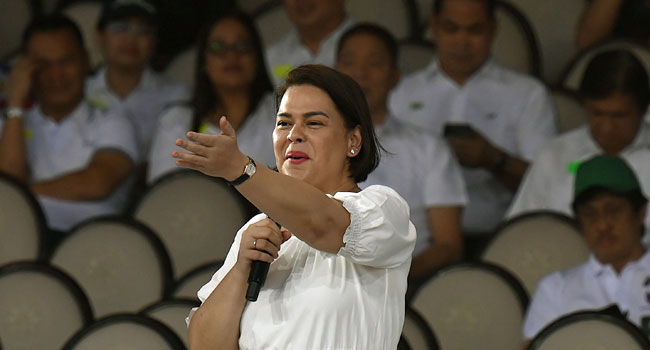Africa
Ethiopians Celebrate New Year Amid High Inflation

Renewed conflict in the north, crippling drought and stubbornly high inflation: Ethiopians rang in their new year on Sunday with little to celebrate.
At a livestock market in the capital Addis Ababa, traders and visitors alike bemoaned the various crises confronting Africa’s second most populous nation.
“As you can see now, everything is expensive. If there was peace it wouldn’t be like this,” trader Endashew Denekew told AFP on Saturday, the eve of the new year holiday known as Enkutatash.
“The peace situation that you see and hear in different places is not good. People stayed at home and didn’t come to the market and bring their livestock.”
Fighting broke out last month between Prime Minister Abiy Ahmed’s forces and the Tigray People’s Liberation Front (TPLF), shattering a five-month truce that had raised hopes of a peaceful resolution to the nearly two-year war.
“The heightened level of conflict and fragility in Ethiopia is of great concern,” the World Bank said in a gloomy report on Ethiopia published on September 8.
“Multiple conflicts combined with historic drought and other shocks have severely impacted millions of Ethiopians, jeopardizing the economic and social development progress the country has achieved in recent years.”
The UN’s emergency response OCHA earlier this month described the humanitarian situation in Ethiopia as “dire”, with 20 million people nationwide in need of assistance because of conflict as well as climatic shocks such as prolonged drought and seasonal floods.
With a population of 115 million, Ethiopia has been one of the world’s fastest-growing economies over the past 15 years, according to the World Bank. But like many has been hard hit by the Covid pandemic and the fallout from the war in Ukraine, as well as its own domestic woes.
Inflation in July was running at 33.5 percent, according to official data, with food inflation at 35.5 percent, deterring people from spending.
“There are not the usual crowds that you would see during the holiday market, like before,” civil servant Chombe Gebrehana told AFP near the main open-air market in the capital.
“Inflation has had its impact. If people had enough money in their hands… we wouldn’t see smaller crowds like this during the holiday market.”
In a recent interview with the state-run Ethiopia News Agency, Abiy’s senior policy adviser Mamo Mihretu acknowledged the cost of living crisis but said the government was taking measures to bring prices under control.
“Our effort is actually bearing fruit because inflation, if not completely addressed, is becoming stable right now,” said Mamo, who is also head of the country’s sovereign wealth fund.
He said the government was adopting reforms to attract investment and trade and forecast economic growth of six percent this year.
Meanwhile, the renewed hostilities in the north have led to a new round of frantic diplomacy to try to end the conflict that first erupted in November 2020.
“May the parties in the conflict have the courage to choose talks over fighting, and participate in an African Union-led process that produces a lasting peace,” the visiting US envoy for the Horn of Africa, Mike Hammer, said in a new year’s message to Ethiopians.
Back at the livestock market, metal worker Assefa Alemu says only a few people are buying.
“I used to buy (sheep) from 4,000 to 5,000 birr (about $75 to $95 at current exchange rates). But today it is 15,000 birr (about $285). Some people have less income, they can no longer afford this… the current situation is very difficult,” he told AFP.
“I think if peace comes to the country, the prices will decrease.”
Africa
When the Gatekeeper Fumbles: JAMB’s Error and the Future of Our Youth

When the Gatekeeper Fumbles: JAMB’s Error and the Future of Our Youth
By Matthew Eloyi
It is not every day that a public official publicly sheds tears. And so, when the Registrar of the Joint Admissions and Matriculation Board (JAMB), Professor Ishaq Oloyede, broke down while admitting to errors in the conduct of the 2025 Unified Tertiary Matriculation Examination (UTME), it was a deeply emotional moment. But make no mistake: while the tears may have reflected remorse, they cannot wash away the consequences of what is, quite frankly, a systemic failure.
Let us be clear — JAMB is not merely an examination body. It is a gatekeeper to higher education in Nigeria. It is the bridge between dreams and their realisation for millions of young Nigerians. To fumble that responsibility is not a technical error; it is a breach of trust with life-altering consequences.
With nearly 380,000 candidates now required to retake the exam due to technical glitches and irregularities, one cannot help but ask: How did we get here? And more importantly, why does this keep happening?
For years, JAMB has marketed its transition to computer-based testing as a step toward modernisation. Yet each year seems to expose new cracks in its implementation — from faulty computer systems and power outages to incomplete biometric verification and poorly configured questions. These are not unforeseeable anomalies. They are predictable outcomes of poor planning, lack of oversight, and inadequate investment in infrastructure.
Imagine the psychological toll on the students, many of whom studied day and night, only to be met with malfunctioning systems and flawed questions. Some walked out of examination halls in tears, their confidence shattered, their futures placed in limbo. For those in remote or under-resourced areas, the technical errors are compounded by infrastructural and economic disadvantages. What we are witnessing is not just an exam failure; it is an institutional failure that amplifies inequality.
JAMB’s decision to allow affected candidates a resit is necessary, but it is insufficient. What about those who may never realize they were victims of the glitch? What about those whose faith in the process has been irreparably broken?
Professor Oloyede’s tears may have been sincere, but what Nigerian students need now is not emotion — it is accountability. Heads must roll, systems must be overhauled, and the entire structure must be audited. We cannot allow a body that plays such a pivotal role in shaping the nation’s intellectual future to operate with such recklessness.
The UTME is a rite of passage for Nigerian students; it should not become a roulette of misfortune. Until JAMB can guarantee a glitch-free, fair, and standardised assessment, its credibility will remain on shaky ground.
In the end, our children deserve better. They deserve an education system that works; not one that breaks down and apologises after the damage is done.
Africa
ECOWAS Confirms Burkina Faso, Mali, Niger’s Exit, Keeps Doors Open for Return

The Economic Community of West African States (ECOWAS) has confirmed that the withdrawal of Burkina Faso, Mali, and Niger from the regional bloc takes effect from January 29, 2025.
ECOWAS spokesperson Joel Ahofodji, in a statement on Wednesday, said the decision aligns with the ECOWAS authority’s resolution and reflects the spirit of regional solidarity and the interests of the people.
Despite their exit, Ahofodji emphasized that the bloc remains open to the return of the three Sahel nations whenever they choose.
“All relevant authorities within and outside ECOWAS Member States should take note of this development,” he said.
To minimize disruptions, ECOWAS urged the continued recognition of national passports and identity cards bearing the ECOWAS logo held by citizens of Burkina Faso, Mali, and Niger until further notice.
Additionally, the commission called for the continued application of the ECOWAS Trade Liberalisation Scheme (ETLS) and investment policies for goods and services from the departing nations. It also stressed that their citizens should retain the right to visa-free movement, residence, and establishment under existing ECOWAS protocols.
Furthermore, ECOWAS requested full support and cooperation for its officials from the three countries as they continue their assignments.
“These arrangements will be in place until the full determination of the modalities of our future engagement with the three countries by the ECOWAS Authority of Heads of State and Government,” Ahofodji stated.
He revealed that ECOWAS has set up a structure to facilitate discussions on these modalities, ensuring a smooth transition.
“This message is necessary to avoid confusion and disruption in the lives and businesses of our people during this transition period,” he added.
The News Agency of Nigeria (NAN) reports that Burkina Faso, Mali, and Niger initially announced their intention to leave ECOWAS on January 29, 2024, in accordance with the bloc’s protocol, which allows for a 12-month notice period. In December 2024, ECOWAS officially acknowledged their right to exit but reiterated its willingness to welcome them back in the future.
Africa
Customs hands over illicit drugs worth N117.59m to NDLEA

The Nigeria Customs Service (NCS), Ogun Area 1 Command, has handed over illicit drugs worth N117.59 million to the National Drug Law Enforcement Agency (NDLEA).
The Comptroller of the command, Mr James Ojo, disclosed this during the handing over of the drugs to Mr Olusegun Adeyeye, the Commander of NDLEA, Idiroko Special Area Command, in Abeokuta, Ogun, on Friday.
Ojo said the customs handed over the seized cannabis and tramadol tablets to the Idiroko Special Command for further investigation in line with the standard operating procedures and inter-agency collaboration.
He said the illicit drugs were seized in various strategic locations between January and November 21, 2024, in Ogun State.
He added that the illicit drugs were abandoned at various locations, including the Abeokuta axis, the Agbawo/Igankoto area of Yewa North Local Government Area, and Imeko Afton axis.
Ojo said that the seizure of the cannabis sativa and tramaling tablets, another brand of tramadol, was made possible through credible intelligence and strategic operations of the customs personnel.
“The successful interception of these dangerous substances would not have been possible without the robust collaboration and support from our intelligence units, local informants and sister agencies.
“These landmark operations are testament to the unwavering dedication of the NCS to safeguard the health and well-being of our citizens and uphold the rule of law,” he said.
He said the seizures comprised 403 sacks and 6,504 parcels, weighing 7,217.7 kg and 362 packs of tramaling tablets of 225mg each, with a total Duty Paid Value of N117,587,405,00.
He described the height of illicit drugs smuggling in the recent time as worrisome.
This, he said, underscores the severity of drug trafficking within the borders.
“Between Oct. 13 and Nov. 12 alone, operatives intercepted a total of 1,373 parcels of cannabis sativa, weighing 1,337kg and 362 packs of tramaling tablets of 225mg each,” he said.
Ojo said the seizures had disrupted the supply chain of illicit drugs, thereby mitigating the risks those substances posed to the youth, families and communities.
He lauded the synergy between its command, security agencies and other stakeholders that led to the remarkable achievements.
Ojo also commended the Comptroller General of NCS for creating an enabling environment for the command to achieve the success.
Responding, Adeyeye, applauded the customs for achieving the feat.
Adeyeye pledged to continue to collaborate with the customs to fight against illicit trade and drug trafficking in the state.
-

 Headlines3 years ago
Headlines3 years agoFacebook, Instagram Temporarily Allow Posts on Ukraine War Calling for Violence Against Invading Russians or Putin’s Death
-

 Headlines3 years ago
Headlines3 years agoNigeria, Other West African Countries Facing Worst Food Crisis in 10 Years, Aid Groups Say
-

 Foreign3 years ago
Foreign3 years agoNew York Consulate installs machines for 10-year passport
-

 News11 months ago
News11 months agoZero Trust Architecture in a Remote World: Securing the New Normal
-

 Entertainment3 years ago
Entertainment3 years agoPhyna emerges winner of Big Brother Naija Season 7
-

 Headlines1 year ago
Headlines1 year agoNigeria Customs modernisation project to check extortion of traders
-

 Economy1 year ago
Economy1 year agoWe generated N30.2 bn revenue in three months – Kano NCS Comptroller
-

 Headlines1 year ago
Headlines1 year agoPhilippines’ Vice President Sara Duterte resigns from Cabinet













